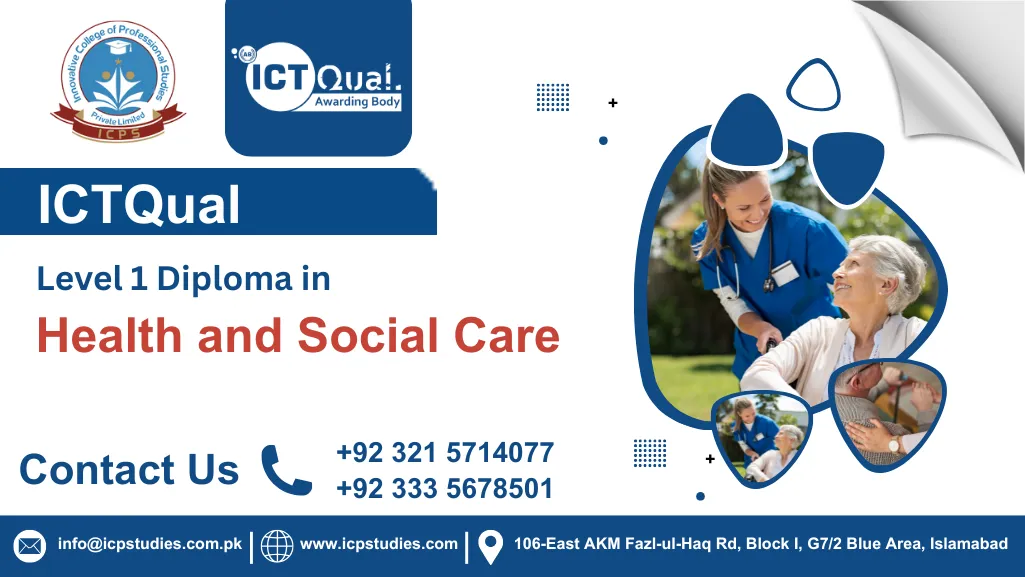Delivering quality health and social care requires a strong foundation in essential skills and knowledge. The ICTQual Level 1 Diploma in Health and Social Care provides learners with an in-depth introduction to the fundamental principles of care, preparing them for entry-level roles in the sector.
This qualification is designed for individuals who are new to health and social care or those looking to formalise their understanding of care practices. It covers a broad range of topics, including assisting individuals with daily activities, understanding their physical and emotional well-being, and maintaining a safe care environment. Learners will explore the importance of effective communication and how to build trust with patients and service users.
A key aspect of this course is recognising the diverse needs of individuals receiving care. Participants will learn about safeguarding policies, infection control measures, and strategies for supporting individuals with disabilities or long-term conditions. The course also highlights the importance of dignity, respect, and ethical decision-making in care settings.
Upon completion, learners will have the necessary skills to work in care environments such as residential homes, hospitals, or community support services. This qualification provides a strong starting point for those looking to build a career in health and social care, ensuring they can deliver safe, compassionate, and effective support.
All About ICTQual Level 1 Diploma in Health and Social Care
Course Overview
The OSHAA 30-Hours Diploma in Autism Social Isolation is a specialized program designed to address one of the most significant challenges faced by individuals with Autism Spectrum Disorder (ASD) — social isolation. This diploma provides learners with a deep understanding of how isolation impacts emotional well-being, communication, learning, and social development.
Through a balance of theory, case studies, and practical strategies, the course equips participants with the tools to foster inclusion, encourage positive social interaction, and build supportive environments in educational, family, and community settings. It highlights effective approaches to reduce barriers, promote engagement, and strengthen connections for individuals with autism.
This program is ideal for educators, caregivers, healthcare professionals, social workers, and anyone working closely with individuals on the autism spectrum. By completing this diploma, learners gain the confidence and competence to make a meaningful difference, ensuring individuals with autism are supported in overcoming isolation and achieving a better quality of life.
Study Units
This qualification, the ICTQual Level 1 Diploma in Health and Social Care, consists of 6 mandatory units.
- Introduction to Health and Social Care Services
- Roles and Responsibilities of Care Workers
- Communication and Interaction in Care Environments
- Safeguarding and Protection of Individuals
- Health and Safety in Care Settings
- Promoting Equality, Diversity, and Inclusion
To enroll in the OSHAA 30-Hours Diploma in Autism Social Isolation, learners should meet the following requirements:
Language Proficiency: Since the course is delivered in English, learners should have a good understanding of written and spoken English to follow the content effectively.
Minimum Age: Applicants must be at least 18 years old.
Educational Background: A high school diploma or equivalent qualification is recommended. Candidates with backgrounds in psychology, education, healthcare, or social sciences will find the course especially beneficial.
Work Experience: No prior professional experience is required. However, those with experience in caregiving, teaching, or community support roles will gain added value.
The OSHAA 30-Hours Diploma in Autism Social Isolation is designed for individuals who want to build knowledge and practical skills to support people with Autism Spectrum Disorder (ASD) experiencing social isolation. This course is ideal for:
- Educators and Teachers who want to create inclusive classrooms and support autistic students facing isolation.
- Healthcare Professionals and Therapists aiming to strengthen their expertise in autism-related social and emotional challenges.
- Social Workers and Community Support Staff who provide care, guidance, and interventions for individuals with ASD.
- Parents and Caregivers seeking effective strategies to support family members with autism in overcoming isolation.
- Students and Graduates in education, psychology, healthcare, or social sciences who want to develop a foundation for careers in autism support and inclusion.
Learning Outcomes
Upon successful completion of this diploma, learners will be able to:
- Understand Social Isolation in Autism
- Define social isolation and its impact on individuals with Autism Spectrum Disorder (ASD).
- Recognize the emotional, behavioral, and developmental consequences of isolation.
- Identify Causes and Challenges
- Analyze key risk factors contributing to social isolation in autism.
- Recognize barriers to social communication and interaction.
- Apply Inclusive and Supportive Strategies
- Implement practical methods to reduce isolation in family, educational, and community settings.
- Design supportive environments that encourage participation and engagement.
- Promote Health, Safety, and Well-being
- Address risks associated with prolonged social isolation.
- Apply safe, empathetic, and inclusive practices for individuals with autism.
- Strengthen Professional Skills
- Collaborate with families, educators, and professionals to support inclusion.
- Demonstrate competence in applying interventions that enhance social connection and quality of life.
FAQs ICTQual Level 1 Diploma in Health and Social Care

